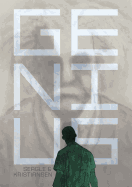
Steven T. Seagle and Teddy Kristiansen's Genius grapples with the idea of being human--what Shakespeare calls "this quintessence of dust." In this profound graphic novel, Ted Halker, who possesses extraordinary knowledge but for a long time lacks "knowing," perfectly embodies the uncertainty principle in quantum mechanics. Faced with professional impasse and family crises, Ted suddenly realizes a prickly truth: a genius is still an incomplete, even impotent man.
Meanwhile, Ted's father-in-law, who suffers from dementia, reveals that he worked as Albert Einstein's bodyguard in the 1930s and was entrusted with Einstein's "terrible secret." Ted imagines Einstein's secret as the end of the world, but his wife dismisses it as something prosaic and tawdry, for Einstein, reputedly a womanizer, "diddled about everything he could diddle." Ironically, the essence of Einstein's truth is also the great man's "failure." Einstein argued that quantum mechanics could not be an objective representation of the natural world, given subjective definitions of "realism," "locality" and "completeness." While Einstein's discomfort with the indeterminacy of quantum physics has long been derided by the scientific world as archaic, Ted's ultimate grasp of Einstein's error affirms his present and ensures his future. --Thuy Dinh, editor, Da Mau magazine

